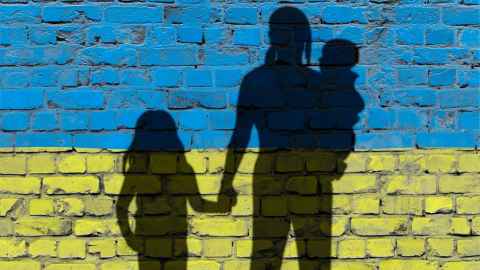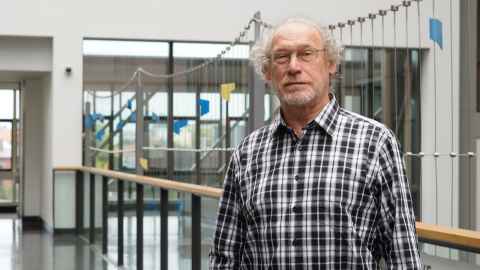Misha Vorobyev: why we should relax rules for Ukrainian refugees
1 November 2023
Opinion: Russian-born academic Dr Misha Vorobyev outlines some of the issues in the war on Ukraine and states the case for New Zealand to allow more Ukrainian refugees into the country.

Just recently, I returned from Europe where I witnessed some of the consequences of the Russian invasion of Ukraine, which began on 24 February 2022.
About six million refugees from Ukraine are registered in Europe, and they can be seen everywhere. These are women, children, and older people only, as men capable of serving in the army cannot leave Ukraine. Millions of Ukrainian children will be raised without fathers and millions of women are separated from their husbands, partners, sons and brothers.
Russian President Vladimir Putin started this war on the pretext of liberating the Russian-speaking regions in Eastern and Southern Ukraine from Ukrainian Nazis. Ironically, the Russian-speaking regions in Eastern and Southern Ukraine suffer from this aggression most, as they are either occupied or have been bombed.
While Ukrainians see the war as an attempt to colonise Ukraine, many Russians believe that their country is fighting Ukrainian Nazis, which in their eyes justifies aggression. But a Ukrainian woman I met in Germany asked me, “Can you explain who the Russians are liberating me from? I have not met any Nazis in Ukraine. I spoke Russian and no one ever asked me to switch to Ukrainian.”
Given that Ukrainian president Volodimir Zelenski is a Russian-speaking Jew, it is difficult to convince people that he leads Ukrainian Nazis. However, Russian propaganda is creative. For example, to justify the allegation that Zelenski is a Nazi, Russian Minister of Foreign Affairs Sergei Lavrov repeated the debunked claim that the Nazi leader Adolf Hitler had Jewish blood.

While Ukrainians see the war as an attempt to colonise Ukraine, many Russians believe that their country is fighting Ukrainian Nazis, which in their eyes justifies aggression.
The atrocities committed by Russian troops – mass murder, torture, and rape – are well documented. Still, Putin sympathisers (within and outside Russia) disbelieve these acts, because they don’t believe the news reported by ‘evil’ mainstream media, such as CNN. Others acknowledge what has occurred, but insist the ends justify the means.
At the right-wing extreme of the political spectrum, Putin is a hero because he leads a crusade for ‘traditional values’ against liberals. Trump called Putin a genius when he started the war against Ukraine. Pro-Russian and anti-Ukrainian policies are currently a part of a worldwide resistance to liberal values. Recently, the anti-liberal sentiment in Slovakia brought to power a pro-Putin politician, Robert Fico, who promised to cut all aid to Ukraine.
At the left-wing extreme of the political spectrum, the Russian war in Ukraine is regarded as a war with the US and the ‘collective West’. Russian propaganda portrays the invasion of Ukraine as part of a fight for the liberation of suppressed nations. Certainly, Russia maintains good relationships with anti-American armed groups such as Hamas. In fact, Russian media went so far as to praise the deadly 7 October Hamas assault, which saw women, children and the elderly killed, attacked or kidnapped.
Similarly, to justify Russia’s invasion of Ukraine, Minister Lavrov claimed that Russia is in a struggle with “those few who use neocolonial methods of subjugation to maintain their elusive dominance”.
Modern Russia inherited its anticolonial rhetoric from the Soviet Union, which claimed to be on the side of suppressed people of Asia and Africa in their fight against colonialism. However, the Soviet Union itself was a colonial empire, inherited from the traditions of 19th-century Russia.
Following the Bolshevik Revolution, which saw the establishment of the Soviet Union, five Russian colonies – Poland, Finland and three Baltic states – gained independence.
Despite the official party line that all nations of the Soviet Union were equal, the then government imposed collective punishments on a number of these independent nations, including Ukraine. It orchestrated a famine in Ukraine (the Holodomor, 1932-1933) that killed millions in retaliation for its refusal to join collective farms.
Citizens of other nations were deported en masse to Central Asia in reprisal for alleged collaboration with Nazi Germany. At least a quarter of the deported Chechens perished in the process.
European victims of Russian colonisation deserve similar kindness to that afforded to refugees from other places.
After the collapse of the Soviet Union in 1991, another 14 nations, including Ukraine, gained independence. However, others remain in the Russian Federation and continue to suffer from oppression; it is still unknown how many died during the Chechen wars for independence (1994-1996 and 1999-2009).
Putin called the collapse of the Soviet Union ‘the greatest geopolitical catastrophe of the 20th century’ and believes his mission is the restoration of the Russian Empire. Following this thinking, the war against Ukraine is a colonial war aimed at eliminating Ukraine as a nation.
However, internationally, Ukrainians are generally not recognised as victims of colonial policies because they are Europeans, in a world where colonialism is generally regarded as something ‘white’ nations have imposed on peoples of colour. But people of all races can suffer from colonisation.
In March 2022, New Zealand created a Special Ukraine Visa to allow refugee Ukrainians to stay for two years. Around 1,500 such visas have been granted and, in August, new residence pathways were created, open to Special Ukraine Visa holders who arrive in New Zealand before 15 March, 2024.
But Ukrainians can only apply for a work visa if they’re sponsored by members of their immediate family who already live in New Zealand. They do not receive any interim financial support from the government. Surely New Zealanders could help Ukrainians by providing shelter or sponsorship in the same way Europeans do? If you agree, check out the link in the box below for the petition.
Having lived in Aotearoa New Zealand for 14 years, I have seen kind attitudes to refugees from Asia and Africa, including to some of my students. European victims of Russian colonisation deserve similar kindness to that afforded to refugees from other places.
Dr Misha Vorobyev is a senior lecturer in the School of Optometry and Vision Science. Born in Russia, he has lived here for 14 years. He helps compile a newsletter (inhabitedisland.com) in Russian, English and Ukrainian with information on the impact of the war on Russians and Ukrainians in New Zealand.
See the petition to encourage the New Zealand government to allow more Ukrainians into the country.
This article reflects personal opinion that is not necessarily that of Waipapa Taumata Rau, University of Auckland.
This piece first appeared in UniNews November 2023.